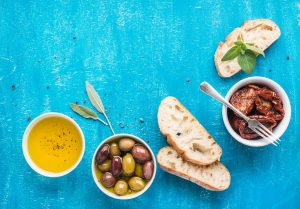 It might not work in a matter of minutes, but a little patience and adherence to the Mediterranean diet could help you avoid erectile dysfunction.
It might not work in a matter of minutes, but a little patience and adherence to the Mediterranean diet could help you avoid erectile dysfunction.
That’s right. New research is suggesting that what you eat could play a role in ED risk.
Advertisement
The Mediterranean diet is no stranger to health benefits. It’s associated with a healthier heart and brain, better memory, and more. And now it’s possible it could contribute to higher testosterone, better blood flow, and better erectile performance.
Better blood flow is likely the primary driver of the Mediterranean diet’s impact on ED. When blood flows better, it’s able to reach every part of the body faster when needed. The diet is also associated with lower cholesterol and more flexible blood vessels, which also helps with blood flow and erection regularity, sustainability, and function.
The results of the work were recently presented at the European Society of Cardiology and are yet to be published in a peer-reviewed journal.
Researchers followed 250 men with high blood pressure and ED. They had an average age of 56.
Participants were quizzed about their diet, with their answers assessed to see how well they actually stuck to the diet. Those sticking to the diet fared better with their erections than those that didn’t. Physically fit participants performed the best.
The diet was associated with higher testosterone and higher levels of nitric oxide.
Advertisement
But it won’t work like Viagra. Eating a Mediterranean meal won’t have you ready to go in 15- or 30-minutes. It’ll be more of a process, as your body will take some time to adjust to the benefits. But in time, it’s likely the benefits will begin to appear.
The Mediterranean looks a lot different from the Standard American, or western, diet. It is primarily plant-based, featuring mainly greens, lentils, and some olive oil. There is some room for fish, but other than that, meat is limited.
It’s important not to get confused with your favorite Greek or “Mediterranean” restaurant. Big servings of lamb, chicken, and feta are surely Mediterranean foods. They just aren’t what people are talking about when they reference the Mediterranean diet loaded with health benefits.
